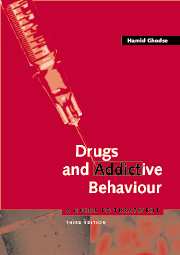Book contents
- Frontmatter
- Contents
- Preface
- Introduction
- 1 Drugs, addiction and behaviour
- 2 Drug dependence in the UK – and elsewhere
- 3 Drugs of abuse and dependence
- 4 Alcohol
- 5 Assessment
- 6 General measures of intervention
- 7 Specific methods of treatment
- 8 Complications of drug abuse and their treatment
- 9 Special problems
- 10 Follow-up and treatment outcome
- 11 Prevention of drug abuse
- 12 The law and drug control policies
- Appendices
- References and further reading
- Index
5 - Assessment
Published online by Cambridge University Press: 06 January 2010
- Frontmatter
- Contents
- Preface
- Introduction
- 1 Drugs, addiction and behaviour
- 2 Drug dependence in the UK – and elsewhere
- 3 Drugs of abuse and dependence
- 4 Alcohol
- 5 Assessment
- 6 General measures of intervention
- 7 Specific methods of treatment
- 8 Complications of drug abuse and their treatment
- 9 Special problems
- 10 Follow-up and treatment outcome
- 11 Prevention of drug abuse
- 12 The law and drug control policies
- Appendices
- References and further reading
- Index
Summary
Introduction
Careful, detailed and thorough assessment of individuals presenting with substance–related problems is essential if they are to receive effective help. The purpose of the assessment is to identify the nature and severity of the drug–related problem; to understand why it arose, to assess its consequences and to establish the strengths and weaknesses of the patient and his or her situation. Armed with this information, it is possible to formulate and develop a treatment programme to help that particular individual to live a full life, integrated into society without the need for drugs.
The need for a very thorough assessment is crystallized by that last phrase, ‘without the need for drugs’. While it is comparatively easy, in the sense of it being a straightforward procedure, to achieve drug withdrawal, continued abstinence (‘staying off’ i.e. relapse prevention) presents much more long–term and challenging problems. After all, having achieved abstinence, the substance–abusing individual usually finds him or herself in the same situation, with the same personal problems and the same personal resources – and with the same substances readily available on demand. Nothing will have changed except a temporary interruption of drug administration and it is perhaps only to be expected that the same behaviour should be resumed and often immediately. The key to staying off is change – in the individual, his or her life situation or the availability of drugs – and the whole point of the assessment procedure is to identify areas where change can be effected so that the need for drugs is reduced or, better still, eliminated.
- Type
- Chapter
- Information
- Drugs and Addictive BehaviourA Guide to Treatment, pp. 163 - 210Publisher: Cambridge University PressPrint publication year: 2002

